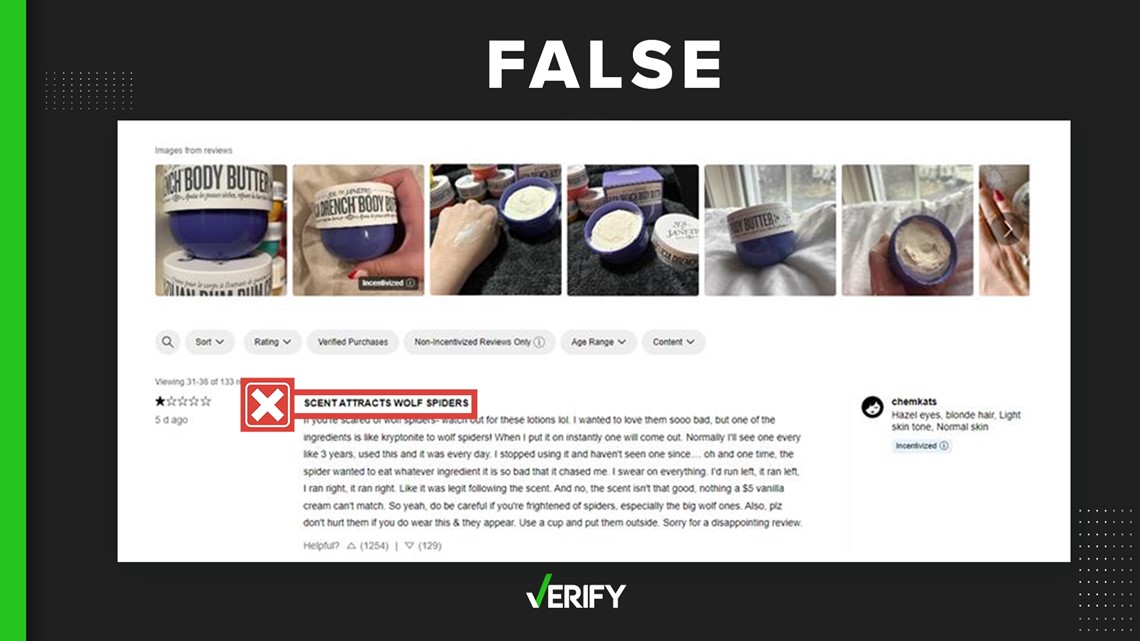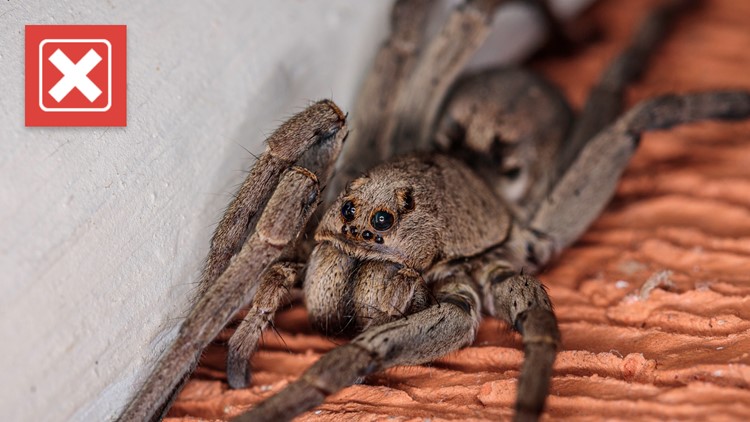An online beauty product review straight out of a horror movie went viral in late December 2023. According to the review posted on the Sephora product page, the Sol de Janeiro Delícia Drench body lotion attracts massive wolf spiders. Wolf spiders are a large but harmless type of spider.
The review spread across social media platforms. Multiple posts about the review on X were viewed millions of times, while people on Reddit guessed that the lotion contains chemicals called pheromones that are attractive to spiders. Meanwhile, Sol de Janeiro’s Instagram page has received numerous comments asking if the spider rumor is real.


THE QUESTION
Can a body lotion sold by Sephora attract spiders?
THE SOURCES
Sol de Janeiro cosmetic brand
Jonathan Larson, Ph.D., an entomologist at the University of Kentucky
Floyd Shockley, Ph.D., an entomologist who works for the National Museum of Natural History
Review history of chemkats, the customer who wrote the viral spider review
THE ANSWER
No, a body lotion sold by Sephora cannot attract spiders.
WHAT WE FOUND
The viral spider review, which has since been removed from the Delícia Drench product page on the Sephora website, was published by Sephora customer “chemkats” on Dec. 24, 2023. In the review, chemkats claimed they rarely saw wolf spiders before using the lotion, then saw wolf spiders everyday when using the lotion and stopped seeing the spiders when they stopped using the lotion.
But chemkats wrote nearly identical reviews in March 2023 and August 2022, claiming other Sol de Janeiro products attract wolf spiders, despite making the claim in the viral review from December 2023 that they rarely encountered the spiders prior to using the lotion.
There is research suggesting that some chemicals common in beauty and skincare products can also be found in the pheromones of certain spiders. Some people have suggested that one study, which found the chemicals farnesyl acetate and hexadecyl acetate in the pheromones of female Pholcus beijingensis spiders, could explain why wolf spiders would be attracted to the lotion.
However, this theory falls apart because of two major issues.
The first is that Sol de Janeiro doesn’t use either of these chemicals in its products, Sol de Janeiro clarified on Instagram.
The second is that the Pholcus beijingensis spider is not a wolf spider. It’s a kind of daddy long-legs spider primarily found in Asia.
“Pheromones are typically very specific to species of spider and insects and everything else,” Jonathan Larson, Ph.D., an entomologist at the University of Kentucky, told VERIFY. He said the pheromones wouldn’t even be the same between two different species of wolf spider.
So even if the lotion had the chemicals that the study mentioned, which it doesn’t, they’d be for the wrong species of spider.
Entomologists doubt that Sol de Janeiro could have inadvertently put a wolf spider pheromone in one of their products, let alone putting it in three different products.
“It would just be almost impossible, I would believe, for a lotion company to accidentally create spider pheromones in their fragrance lab and put it into a product,” Larson said.
Floyd Shockley, Ph.D., an entomologist at the National Museum of Natural History, said the combination of chemicals needed to accidentally create a spider pheromone would have to be so perfect that the odds of it happening are “essentially zero.”
Both entomologists explained that pheromones don’t just require the right chemicals, they also require the right amounts of chemicals. Have a little too much of one chemical or not enough of another and the spider will become disinterested in the scent.
Another flaw with the claim is that pheromones would attract male wolf spiders, which are dead during the winter in much of the U.S., Larson said. If the reviewer had their spider problem shortly before making the December review, then they’d be seeing female spiders.
Wolf spiders aren’t any more likely to be attracted to the scent of the body lotion than they are to the chemicals, either.
“We know that there are certain perfumes, for instance, that have shown attractiveness to mosquitoes,” Shockley said. “However, there's never really been any direct evidence of such a thing with spiders.”
Shockley and Larson both suggested that the reviewer and other people might be coincidentally seeing more spiders and falsely linking it to their lotion. As the weather gets colder, outdoor wolf spiders begin moving indoors, increasing the likelihood of spiders and humans interacting, Shockley said.
Finally, Shockley and Larson alike said that wolf spiders aren’t anything to be afraid of.
“If you're going to have a spider following you around, this would be one of the ones I would pick,” Larson said. “They're practically harmless.”
Shockley noted that some wolf spiders hunt and chase more dangerous spiders, such as brown recluses.
“Wolf Spiders are your friends,” Shockley said.













